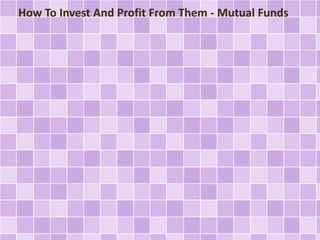
How To Profit From Mutual Fund Investing
- 1. How To Invest And Profit From Them - Mutual Funds
- 2. Although investing in mutual funds isn't the type of subject associated with wild parties and celebrations - it is something the serious investor should consider as a way of increasing their total worth. "But what EXACTLY is a mutual fund" I hear you ask - "how does it work, who does what and how much do they cost?" Hang on, slow down - one question at a time please.
- 3. If you believe markets are generally efficient and prefer to invest in an index mutual funds to achieve an index-like return, shopping for the best index mutual fund based on low fees and a low expense ratio makes good sense. The portfolio manager of an index mutual fund endeavors to invest the fund's assets to track the index as closely and cost-effectively as possible. Larger index funds have an advantage in that they can spread their operating costs over a larger asset base. Some of the interesting index mutual fund options currently available include no load index mutual funds like E*Trade S&P 500 Index Fund (Nasdaq: ETSPX), Fidelity Spartan 500 Index Fund (Nasdaq: FSMKX), and Vanguard
- 4. 500 Index Fund (Nasdaq: VFINX) with expense ratios of 0.09%, 0.10%, and 0.18%, respectively.
- 5. Mutual fund fees and expenses are just one of several important factors to consider if you believe portfolio managers can add value and out-perform the index through active management. The portfolio manager's ability and investing style are just as important. Therefore, seeking out the best mutual fund based on just low fees and a low expense ratio may not always be the right approach. It may just be a case of being 'penny-wise and pound-foolish'. Legendary investor Peter Lynch, who managed the Fidelity Magellan Fund (Nasdaq: FMAGX) from 1977 to 1990, achieved returns well in excess of the market averages even after accounting for the fund's fees and expenses. So too has Bill Miller who
- 6. currently manages the Legg Mason Value Trust (Nasdaq: LMVTX). Even after accounting for its relatively high 1.7% expense ratio, this no load mutual fund has achieved compound annual returns of 18.6% for the 10 year period ending in 2004, well in excess of 12.0% for the Vanguard 500 Index mutual fund.
- 7. Ratings are significant in differentiating between good and bad funds. So do a rigorous research while you assess mutual funds. You must look at the quantifiable and computable features of a fund and also check the returns against the target, costs incurred, taxes liable, risks involved and manager term. Although you can refer the rating systems yet you must not just blindly invest in the funds with best ratings. You must check the rating against the real time performance of the mutual funds.
- 8. Some mutual funds impose short-term trading fees to discourage frequent trading of mutual fund shares. Frequent trading disrupts efficient management of the mutual fund and increases operating expenses. A short-term trading fee can therefore actually be beneficial to long-term shareholders if the fee is rightly treated by the mutual fund company.Fidelity Spartan Total Market Index Fund (Nasdaq: FSTMX), for example, follows the practice of returning short-term trading fees collected on shares held less than 90 days to the mutual fund itself rather than passing on the benefit to the mutual fund company. By having this short-term trading fee structure, this no load mutual fund seeks to contain
- 9. its operating expenses. Such fees are therefore aligned with the interests of long-term shareholders of this mutual fund.
- 10. So hunt around, compare not only price but also service and past record to date. And remember - a mutual fund is still based on products themselves that can reduce in value as well as increase - so never invest more than you can afford to be without, just in case!!